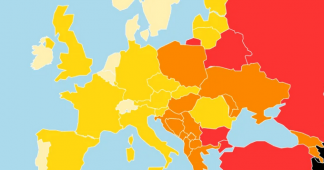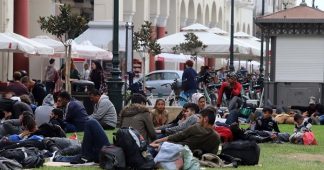Tasos Kokkinidis
Greece has been accused of limiting the freedom of the press freedom after the government earlier in the week brought before Parliament changes to the penal law that foresees heavy penalties for media that are deemed to spread fake news.
The Greek journalists union ESIEA warned that “there is a danger that Justice will intervene and restrict the constitutionally guaranteed freedom of speech and expression of opinions about what is happening around us.”
On Wednesday, the International Press Institute (IPI) also condemned the changes, saying that “the draft law’s vague definition and punitive sanctions would undermine the freedom of the press and have a chilling effect at a time when independent journalism is already under pressure in Greece.”
The controversial article in the new penal code
Article 36 of the new penal code, which is now under debate in the Greek Parliament, says:
“Anyone who publicly or via the internet spreads or disseminates in any way false news that is capable of causing concern or fear to the public or shattering public confidence in the national economy, the country’s defense capacity or public health shall be punished by imprisonment for at least three months. and a fine.
“If the act was repeatedly committed through the press or via the internet, the perpetrator is punished with imprisonment of at least six months and a fine. The actual owner or issuer of the instrument with which the acts of the previous paragraphs were performed is punished with the same penalty.
“Anyone who through negligence is guilty of any of the acts of the previous paragraph shall be punished by imprisonment of up to one year or a fine.”
The controversial article is part of a bill that foresees tougher penalties for heinous crimes, such as rape or the sexual abuse of minors.
IPI says that it understands the serious threat that disinformation poses to Greek society and other states around the world. It notes that globally, online falsehoods and conspiracy theories are distorting reality, undermining democracy, and jeopardizing the fight against the Covid-19 pandemic.
Fake news gaining a foothold in Greece
A recent survey by the Media Literacy Index 2021 shows that fake news is gaining a foothold in Greece, as it ranks poorly among countries in Europe regarding the evaluation of news.
Greece is one of the most vulnerable countries in Europe to misinformation and fake news, coming in 27th place among 35 countries in the rankings on that metric.
A case in point is the conspiracy theories surrounding coronavirus vaccinations, an issue of paramount importance for the protection of public health. However, public safety is being compromised by a proliferation of fake news and unscientific views that have been circulating over the past months.
Heavy-handed legislation no answer to fake news
However, the IPI says that “the passing of heavy-handed legislation by governments which grants regulators or prosecutors the power to decide true from false and levy punitive fines on the press is not the correct response, and would result in more harm than good.
“As we have seen around the globe, subjective interpretation of such vaguely-worded laws can open the door to censorship of legitimate reporting. Media in Greece already face threats from abusive litigation and jail sentences for criminal defamation.”
The organization notes that it has documented at least 17 countries worldwide in which some form of legislation or decree has been passed against “online misinformation” or “fake information”.
IPI Deputy Director Scott Griffen said that while no two pieces of “fake news” legislation passed since the outbreak of Covid-19 were identical, all ultimately posed a threat to press freedom in their capacity for misuse.
“Disinformation poses a serious challenge to open societies, and the coronavirus pandemic has shown just how dangerous online falsehoods and conspiracy theories can be,” he said.
“But while combating online disinformation is a legitimate objective in general, handing governments and state-controlled regulators the power to decide what information is true and what is false is a dangerously wrong path.
“This is especially the case when this power has no expiration date, as is the case with many of the ‘fake news’ measures introduced under the pandemic. In the wrong hands, like openly authoritarian states, these ‘fake news’ laws are an obvious tool of repression. But even in the ‘right’ hands, there is no such thing as good state censorship,” Griffen declared
Published at greekreporter.com
We remind our readers that publication of articles on our site does not mean that we agree with what is written. Our policy is to publish anything which we consider of interest, so as to assist our readers in forming their opinions. Sometimes we even publish articles with which we totally disagree, since we believe it is important for our readers to be informed on as wide a spectrum of views as possible.











